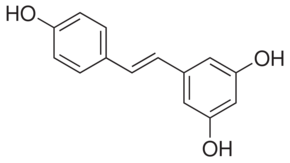Many of you have requested more science facts about resveratrol. And I apologize for the delay in writing this post. Here you’ll find all you need to know about resveratrol from a scientific point of view.
What is Resveratrol
Resveratrol is a phenolic phytoalexin found in grape skin and other plants. That means that it is a healthy nutrient found in plants. From the human perspective it’s a healthy nutrient, but from the plant’s perspective it’s a disease fighter. Resveratrol is produced by plants when it needs help protecting itself from disease and problems.
In fact if you really want to find a highly concentrated source of resveratrol, first look for a source like grapes. Then find grapes growing in a rough environment like an organic farm up north. There the grapes would have to protect themselves from bugs, disease and frost. That’s a hotbed for resveratrol growth.
Chemical Structure of Resveratrol

Chemical Formula: C14H12O3
Molecular Weight 228.24
Scientific Name of Resveratrol
Synonyms: 3,4′,5-Trihydroxy-trans-stilbene
3,5,4-prime-Trihydroxystilbene
3,4′,5-Trihydroxystilbene
3,4′,5-Stilbenetriol
trans-Resveratrol
cis-resveratrol
Resveratrol
Sources of Resveratrol
Resveratrol is found in many things, well not too many actually. Resveratrol supplements are made from Japanese Knotweed root. Companies use that source because Knotweed grows very fast making it cheap to produce.
It is also found in:
- chocolate
- grapes
- blueberries
- bilberries
- chocolate
- yucca
- cranberries
- eucalpytus
- spruce
- lily
- peanuts
And that’s a fact, Jack. (well a scientific fact about resveratrol that is)
How Much Resveratrol do you need?
Supplement manufacturers suggest 500 mg/day because that’s the amount to help an able bodied adult. For kids, it’s lower.
As long as your kids are eating healthy they are getting the benefits of resveratrol in peanut butter, chocolate and grapes.
Supplements are typically necessary to get the best benefits. Ordinary non-muscadine Red wine contains between 0.2 and 5.8 mg/L [1], a far cry from 500 mg/day.